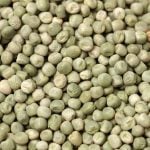With Triffid flax on their minds, the federal New Democrats are bringing forward legislation that would require “potential harm to export markets” to be considered before genetically modified (GM) seeds are approved for sale to farmers in the future.
British Columbia MP and NDP agriculture critic Alex Atamanenko plans to have his bill, amending the federal Seeds Regulations, up for debate Wednesday (March 17).
Atamanenko’s Bill C-474, which got first reading March 3, comes to the House of Commons as a private members’ bill, a type which only rarely makes it through Parliament to become law.
Read Also

Pea, lentil outlooks have some positive signals – Penner
As pulse growers consider what to plant this spring, Chuck Penner of Leftfield Commodities Research said there is some optimism in the Canadian pulse market. Penner gave a presentation at the Saskatchewan Pulse Growers meeting in Swift Current on Feb. 4.
The NDP said Tuesday it expects the bill “will likely come to a vote sometime this spring.”
“Presently, Canadian approvals of new (GM) seeds are based on environmental and health assessments, but ignore the question of any potential harm to export markets,” the party said in a release.
C-474 aims “to fill the regulatory gap which led to the rejection of Canadian flax shipments to Europe,” the party said.
That’s a reference to what the party calls “widespread contamination” of Canada’s flax by CDC Triffid, a GM flax variety that was approved and then deregistered in 2001 without ever being commercialized.
Canada’s flax industry had successfully lobbied for Triffid’s deregistration, for fear of losing access to its substantial export markets in Europe and other GM-shy markets if a GM flax were introduced.
But several importing countries shut their ports to Canadian flax last fall after a number of samples tested positive for markers of Triffid.
Triffid’s genetic material was later found to have contaminated breeder seed of two conventional flax varieties, CDC Normandy and CDC Mons. Trace levels (below 0.01 per cent) have been detected in three other registered varieties.
“The government has an obligation to protect farmers from the interruption of markets and, by so doing, protect the economic interests of all Canadians,” Ontario organic produce grower Maureen Bostock said in the NDP’s release on behalf of the National Farmers Union.
Lucy Sharratt, co-ordinator for the Ottawa-based Canadian Biotechnology Action Network, said in the NDP’s release that the private member’s bill is “immediately needed to address the foreseeable economic threat posed by (GM) alfalfa, for example.”
While GM alfalfa hasn’t yet been commercialized, Ontario MP and NDP deputy ag critic Malcolm Allen said in the same release that if it is, “it will only be a matter of time” before its genetics turn up in non-GM alfalfa and “we begin to see serious economic consequences to Canadian farmers who grow for domestic and international markets.”















